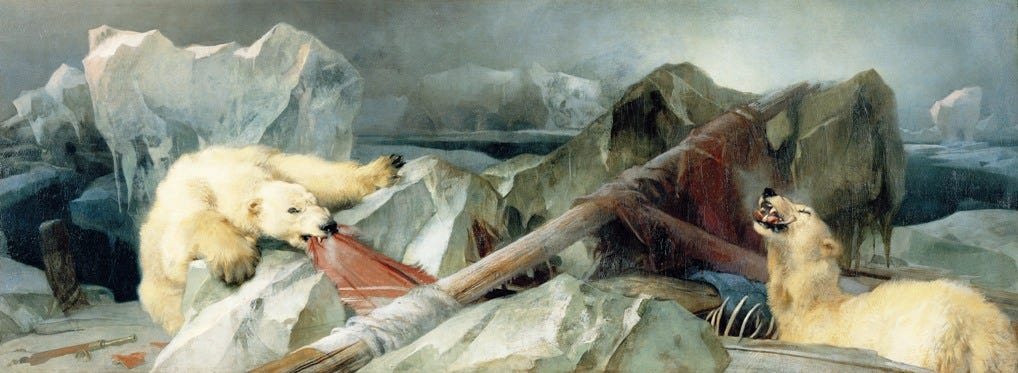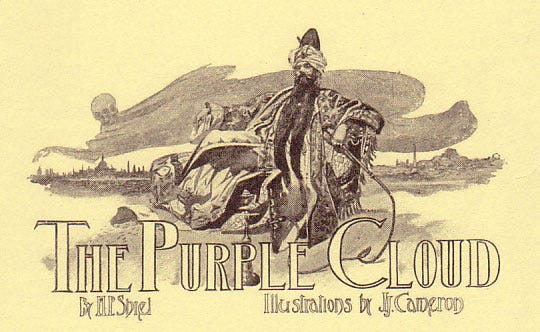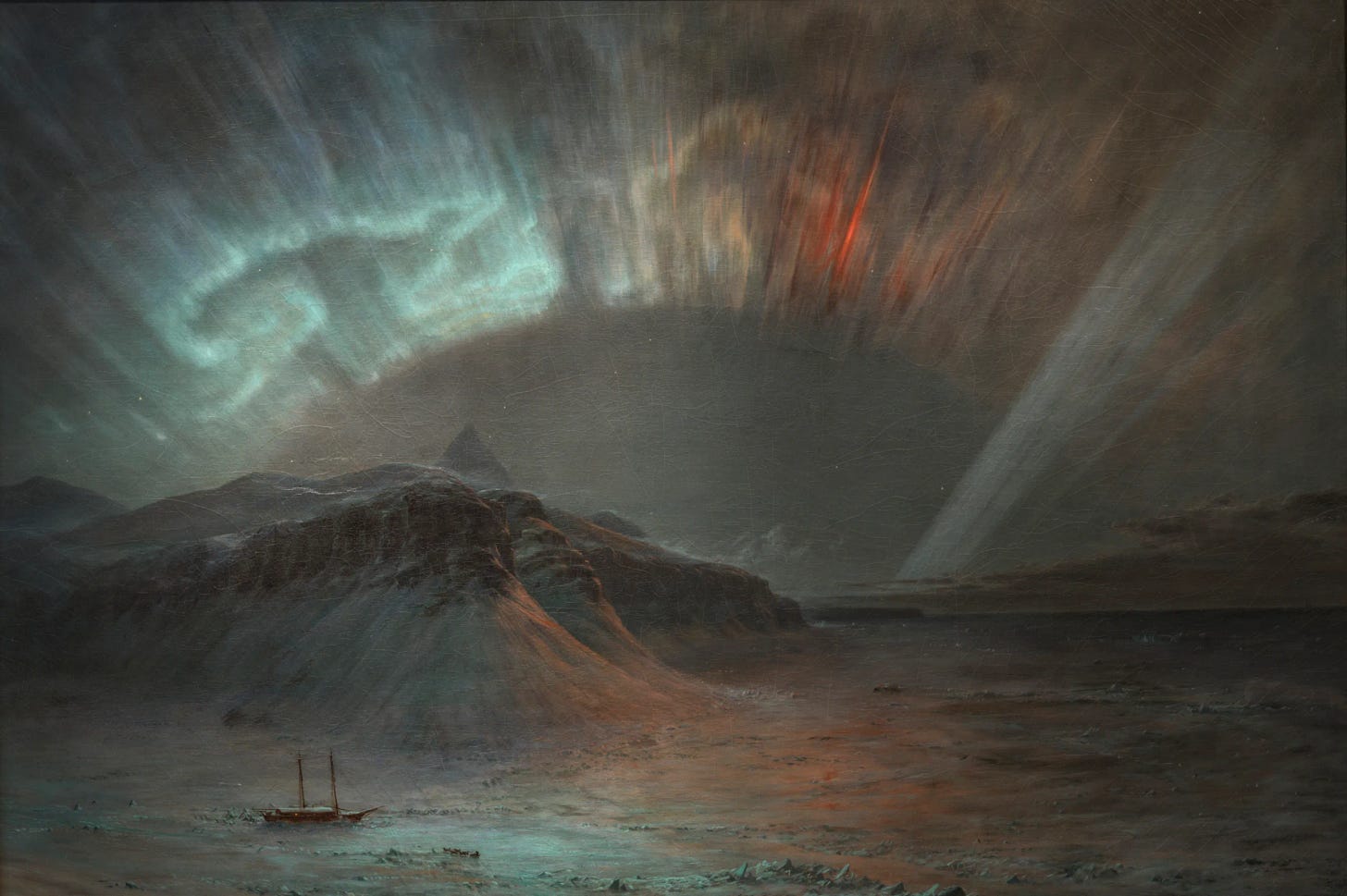The Magnetic North
Journey to the North Pole with this excerpt from M.P. Shiel's cult classic The Purple Cloud, which finds Adam Jeffson and his ship's crew floating through the impassable Arctic ice.
From The Purple Cloud by M.P. Shiel
The next day the storm died away, and either three or four days later the slush-ice between the floes froze definitely. The Boreal's way was thus blocked. We warped her with ice-anchors and the capstan into the position in which she should lay up for her winter's drift. This was in about 79° 20' N. The sun had now totally vanished from our bleak sky, not to reappear till the following year.

Well, there was sledging with the dogs, and bear-hunting among the hummocks, as the months, one by one, went by. One day Wilson, by far our best shot, got a walrus-bull; Clark followed the traditional pursuit of a Chief, examining Crustacea; Maitland and I were in a relation of close friendship, and I assisted his meteorological observations in a snow-hut built near the ship. Often, through the twenty-four hours, a clear blue moon, very spectral, very fair, suffused all our dim and livid clime.
It was five days before Christmas that Clark made the great announcement: he had determined, he said, if our splendid northward drift continued, to leave the ship about the middle of next March for the dash to the Pole. He would take with him the four reindeer, all the dogs, four sledges, four kayaks, and three companions. The companions whom he had decided to invite were: Wilson, Mew, and Maitland.
He said it at dinner; and as he said it, David Wilson glanced at my wan face with a smile of pleased malice: for I was left out.
I remember well: the aurora that night was in the sky, and at its edge floated a moon surrounded by a ring, with two mock-moons. But all shone very vaguely and far, and a fog, which had already lasted some days, made the ship's bows indistinct to me, as I paced the bridge on my watch, two hours after Clark's announcement.
For a long time all was very still, save for the occasional whine of a dog. I was alone, and it grew toward the end of my watch, when Maitland would succeed me. My slow tread tolled like a passing-bell, and the mountainous ice lay vague and white around me, its sheeted ghastliness not less dreadfully silent than eternity itself.
Presently, several of the dogs began barking together, left off, and began again.
I said to myself; 'There is a bear about somewhere.'
And after some five minutes I saw—I thought that I saw—it. The fog had, if anything thickened; and it was now very near the end of my watch.
It had entered the ship, I concluded, by the boards which slanted from an opening in the port bulwarks down to the ice. Once before, in November, a bear, having smelled the dogs, had ventured on board at midnight: but then there had resulted a perfect hubbub among the dogs. Now, even in the midst of my excitement, I wondered at their quietness, though some whimpered—with fear, I thought. I saw the creature steal forward from the hatchway toward the kennels a-port; and I ran noiselessly, and seized the watch-gun which stood always loaded by the companionway.
By this time, the form had passed the kennels, reached the bows, and now was making toward me on the starboard side. I took aim. Never, I thought, had I seen so huge a bear—though I made allowance for the magnifying effect of the fog.
My finger was on the trigger: and at that moment a deathly shivering sickness took me, the wrangling voices shouted at me, with 'Shoot!' 'Shoot not!' 'Shoot!' Ah well, that latter shout was irresistible. I drew the trigger. The report hooted through the Polar night.
What we love about this passage…
The cabin fever is palpable! Despite the seeming nobility of the mission to be the first men to reach the pole, the crew is not above resentments and jealousies. Such tension is heightened by the the threatening, mysterious landscape: fog, ice, and, as Shiel so wonderfully puts it, ‘sheeted gastliness.’
In 1901, when Shiel was writing, polar exploration had already attracted explorers for centuries; however, still not one of them had made it to the North Pole. This was achieved less than ten years after the novel’s publication, in 1909.

About the Author
M.P. Shiel (1865-1947) was born on the island of Montserrat in the Caribbean. He became well-known in the 1890s for his adventure and science fiction, including The Purple Cloud. Less known today, his fiction attracted substantial attention by writers of the time such as H.G. Wells.
To read alongside…
Fiction featuring the Arctic has a long history. Most well-known perhaps is Mary Shelley’s Frankenstein (1818), which is framed by the Arctic and begins with Robert Walton’s description of the polar sun: ‘I try in vain to be persuaded that the pole is the seat of frost and desolation; it ever presents itself to my imagination as the region of beauty and delight. There, Margaret, the sun is for ever visible, its broad disk just skirting the horizon and diffusing a perpetual splendour.’ Re-visit the end of Walton’s trip to the Arctic with one of our first newsletters.
Related imaginative journeys to these regions include Harriet Prescott Spufford’s ‘The Moonstone Mass’ (1868) and Arthur Conan Doyle in ‘The Captain of the Pole-Star’ (1883). A favorite writer among the LitHits team, Elizabeth Robins, made her own exciting journey to the North, partly in search of her long lost brother. She drew on the experience of this trip in her writing for the rest of her life, including her once well-read novel called… The Magnetic North (1904). You can read an excerpt from an exciting short story of hers in this past newsletter.
If you’re interested in learning more about the first party of explorers who actually made it to the North Pole, then check out Matthew Henson’s fascinating memoir A Negro Explorer at the North Pole (1912), featured in a past newsletter.
Suggest a LitHit!
Tell us your own favourites from literature you've read, and we can feature you as a Guest Curator. Just email us with the following information:
Your full name
The title of the book you're suggesting
The location of the excerpt within the book (e.g., "in the middle of chapter 5"), or the excerpt itself copied into the email or attached to it (in Word)
Why you love it, in just a few sentences
About LitHits
LitHits helps you make time for reading by bringing you unabridged excerpts from brilliant literature that you can read on the go, anytime or any place. Our curators carefully select and frame each excerpt so that you can dive right in. We are more than a book recommendation site: we connect you with a powerful, enduring piece of literature, served directly to your mobile phone, tablet or computer.
Today's guest curator...
Dr Daniel Abdalla, core member of LitHits and an expert in nineteenth and twentieth-century literature, particularly its relationship to science.
You might also enjoy...
Feedback
We'd love to hear your thoughts on our newsletter:
kirsten@lit-hits.co.uk
Graphic design by Sara Azmy
All curation content © 2023 LitHits. All rights reserved.




